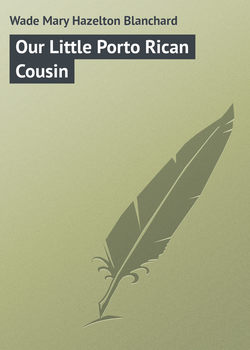Читать книгу Our Little Porto Rican Cousin - Wade Mary Hazelton Blanchard - Страница 3
CHAPTER II.
DOLORES
ОглавлениеAnd now he goes from his room out into the courtyard, for the house is only one story high. His sister Dolores is there already, and runs to kiss him good morning.
"Oh, Dolores," says Manuel, "do you think we have time before our lessons begin to go over to Salvador's and see if he got those fireflies yet? He was to bring them to me last night."
"It's only nine o'clock now, we have an hour yet," answers Dolores, in her sweet voice. "I'm all ready, so let's go."
Both children put on their broad white hats and take a shady path through the fields. They soon reach the huts of the coloured workmen, clustered together in a grove of pimento-trees. A "pimento-walk" such a grove is sometimes called, and it would be hard to find anything more beautiful. The trees are of nearly the same height, reaching up about thirty feet from the ground. The branches are covered with glossy green leaves. The berries are not yet ready to pick, but when they are still green the coloured boys on the place must climb the trees and break off the twigs; they will throw them down to their sisters on the ground, who will pick off the berries and store them in bags for their master to send to the United States mainland. We call these berries "allspice," and after they have been dried we buy them under that name.
The huts of the workmen are scarcely more than sheds with roofs of thatched palm leaves. Some have sides and doorways, while others are quite open. What do these poor people care for that in this land of summer? If they have plantains enough to satisfy their hunger, plenty of cigars to smoke, and hammocks of the bark of the palm-tree to swing in, they are happy and contented.
Within the huts one can see a few earthen pots and gourds; that is all that is needed in their simple housekeeping, whether they belong to the black race or are "jibaros," as the poor whites are called. And most of the people are poor in this beautiful land, although Mother Nature is so generous here in her gifts to men.
But we must go back to Manuel and Dolores, who are quickly surrounded by a group of little children. They are of all colours: some black as jet, the whites of their eyes looking like windows; others of shades running from dark brown to pale yellow. But they are all noisy, all happy, all talking at the same time, and all naked.
As for Dolores, herself, the dainty little maiden wears only a cotton slip at her play. Many another white child on the island goes about her home with no clothing, and feels very comfortable, too. It is only when the children get to be nine or ten years old that their parents make them dress; and that is a sad time for them, you may be sure.
But Dolores lives in quite a grand way, you know, so she and Manuel were never allowed to go about naked since they were old enough to walk.
But look! one of the little black boys is handing something to Manuel. It is a net filled with the fireflies or beetles he wished to get.
"Come to the house to-night, Salvador," says Manuel, as he takes his treasures, "and I will pay you."
Now what do you suppose Manuel cares for these beetles? They are not beautiful in the daytime. We would far rather watch those lovely green and blue butterflies flitting among the bushes. But Manuel is going to make pets of them. He will put them in a little wicker cage, feed them with sugar, and they will grow quite tame. At night they will be more beautiful than any precious gems owned by his mother.
Let us examine them. They are of a dull drab colour, except around the eyes and underneath, where there are rings or bands that glow brightly in the dark, giving forth red and green lights. They gleam like diamonds. Manuel can read by their light, should he choose to do so. The fireflies of Porto Rico are the largest and most brilliant in the whole world.
After the children have finished their lessons to-day, perhaps they will take some calabashes and bore holes in them. Then when night comes they can put the beetles inside and play outdoors with them for lanterns. Some of the poor people in Porto Rico use no other light at night, except these little creatures.
Manuel carries the net very carefully as he and his sister return to the house. He does not wish a single beetle to be injured or frightened.
"Mamma dear!" he calls as he sees his mother on the veranda, "you shall wear the most beautiful one I have in your lace dress to-night."
What a strange idea this seems to us! but the smiling lady in her white wrapper does not seem at all surprised. She often fastens the living gems under the thin net of her evening gown; perhaps they will glisten on her shoulders, perhaps at her throat, or in her hair. She certainly could not wear more beautiful jewels than these.
"Thank you, my precious child," she answers, "you are very thoughtful; but now your teacher is waiting for you in the schoolroom. Go to her, and give your studies good attention this morning."
